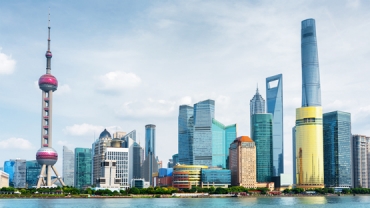
Cold Contest Inc. - PwC China Compass
17 June, 2021
A cold contest between the West and China threatens our most important agent of change: The stock corporation. The Cold War ended with the fall of the Berlin Wall, when the East awoke from its dogmatic slumber and embarked on a more speculative philosophy: that of free markets. Up to that point, history had oscillated between tyranny and something better, with tyranny being the norm.
The fall of the Soviet empire finally put an end to this cycle. Liberals felt vindicated. With no false modesty, they proclaimed it the end of history. History, however, treading a path of romantic gloom, swiftly reverted to its natural course.

No alternative to progress
The reason for history’s unsteady relationship with power lies in an underappreciated insight from cooperative game theory: “Majority games, formally described as games of agents where any subset of more than half of them can capture a fixed reward, a setup eerily similar to corporate governance, politics and many other situations in human life, are part of a set of inherently unstable games”, writes Vitalik Buterin, a contemporary philosopher. There is “no system which will prove fully satisfactory” and, therefore, no end to history.
Majority games are inherently instable
In spite of such shortcomings, the promise of progress and prosperity tempts us to play cooperative games; in fact, we must play them, if anything at all is to be achieved (the only alternative being Hobbes’s “war of all against all”). In this general outline, the question of history becomes one of good versus bad collusion. How to get one without the other?
Friedrich Hayek, the liberal economist, argued that there can never be an omnipotent ruler on top of any hierarchy, because such a creature (if not an actual deity) would lack the perfect information required to coordinate the whole system. He advocated for a decentralized approach, where the individual acts according to her local knowledge. But even Hayek’s concept of decentralization is prone to bad collusion: At any moment “well-connected and wealthy participants could overpower it”, so Buterin, and divide the bounty among themselves. Undoubtedly free market liberals despise such behavior. To protect us from inequities, they invented anti-bribery laws and anti-trust laws, for good measure. The problem itself remains unsolved. Bad collusion is always possible; we can only make it less probable. We do this much as an online store handles its merchants: By rewarding the good guys, and by imposing costs on those who cheat. Good collusion, by and large, wins out.
The best example of good collusion is our most powerful agent of change: the modern stock corporation. It is the stock corporation that creates everything our hearts desire, and since our desires are infinite it speculates on new things we didn’t even know we needed, like Dr. Karikó’s mRNA. Despite such unselfish motives, the stock corporation has come under fire. It must now face a new challenge: Fighting a cold contest (or a continuation of politics by other means, as von Clausewitz would have called it).
The prelude to the cold contest was all politics: skirmishes, fought with the pen, by governments, under the veneer of mutual respect and reciprocity. Its means were tariffs and monetary policy. The cold contest, however, doesn’t retain the goodwill of its predecessor. Its players are more varied and covert, and include non-state agents, who may not abide by the norms they wish to overthrow. Its means are more asymmetrical and sinister, ranging from cyber-attacks to domestic interference. The countermeasures are no longer in the domain of trade regulation, but in the much more consequential realm of national sovereignty. Trump, on the grounds of national security, signed an executive order to ban Chinese social media apps (a decision recently modified by President Biden). China, which dislikes seeing its authority contested almost as much, recently clarified – for those who were wondering – the broad extraterritorial scope of its national security laws. For corporate CEOs, who often sit in the hot seat, international compliance – and travel – are becoming a guessing game.
The Cold War, of course, didn’t feature stock corporations. The Soviets didn’t have any. They had the Mikoyan and Gurevich Design Bureau, whose international ambition – while passionate – was limited to assuring mutual destruction. It’s fighter jets never filed for an initial public offering on the New York Stock Exchange. On the contrary, China and the West are deeply interconnected and both have placed large bets on each other’s markets – mainly through stock corporations. This is a new trend. Until well into the 20th century, the idea of investing a college fund in stock corporations, as John Maynard Keynes did, seemed adventurous. Unsurprisingly, Keynes – being Keynes – prevailed. The stock corporation became a popular icon even among the common people. It created more wealth than anything before it. It provided innovation and standardization at scale, until its products and services reached every corner of the world. As its global clientele grew richer, the corporation could no longer rely on cheap products alone to sway their interest. It had to build on culture, too. It made things cool. It created heroes.
“In my opinion, corporate culture is underrated as a tool for progress.”
Its cosmopolitan outlook already embraces all nationalities and, increasingly, all sexes and ethnicities, and unites them under a common mantra. (It is a curious fact that corporate mission statements often promote public goods, not self-interest.) What’s more, this panhuman utopia has proven nimble in finding creative solutions to unforeseen problems – such as in fighting global pandemics. It is regrettable, therefore, that this cold contest must be fought on the back of our most creative institutions.
Biggest advantage: creative solutions to problems
Needless to say, corporations didn’t want any of this. Few are political activists. Most will prefer loyalty to customers over Queen and country. Big business is not the epitome of democracy, but at least it represents another center of power: When the US, under Trump, folded on climate change, some of the most outspoken criticism came from corporations, many of which doubled down on their efforts to cut carbon emissions. In China, ironically, it is the most reform-minded companies – privately owned tech – which have drawn ire from politicians at home and abroad. But whereas China’s politics remains faithfully communist, its corporate governance looks strikingly Western. The system encourages transparency and stakeholder accountability and, on occasion, produces bouts of shareholder activism that would make its Western counterparts proud – all attributes not necessarily associated with the country’s political class. How much of it will survive to witness the end of the cold contest?
The differences between Western and Chinese political organization were conveniently brushed aside for a long time, not least because the West believed that the culture of markets and private ownership was the culture of freedom. Critics have argued that Hayek only cared about capitalism, and not about democracy per se. But for Hayek, free enterprise was the antidote to tyranny. He has yet to be proven wrong.
Stephan Fölsing
Email
About the author
Stephan Fölsing advised on cross-border M&A deals – between 2010 and 2017, mostly at PwC Shanghai. He lives in Hamburg.









